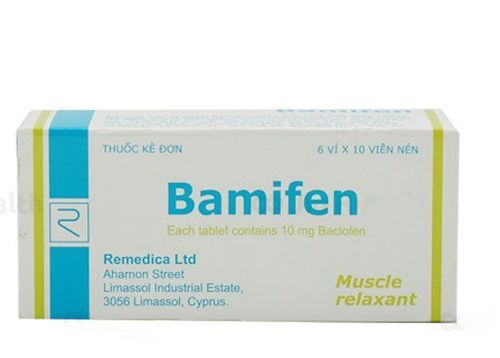This is an automatically translated article.
Attention-deficit/hyperactivity disorder and oppositional defiant disorder are two disorders that involve unusual and common behaviors in children. Although these are two completely different disorders, they have certain connections.Attention-deficit/hyperactivity disorder and oppositional defiant disorder both share some of the same symptoms, sometimes the same person has both at the same time. To better understand the relationship between ODD and ADHD, let's go through the definition, symptoms, causes, and treatment of both conditions.
1. What is attention deficit hyperactivity disorder and oppositional defiant disorder?
Childhood excessive behavior can happen in children and it does not always mean that the child has a conduct disorder. It is a normal development for a short period of time in a child.
However, some children have disruptive behavior patterns, which happen uncontrollably and often last for a while. From there, leading to children being diagnosed with behavioral disorders. One of the most common behavioral disorders in children is attention deficit hyperactivity disorder (ADHD) or oppositional defiant disorder (ODD).
Children with Attention Deficit Hyperactivity Disorder (ADHD) are easily distracted, live disorganized, and they may have trouble sitting still and focusing on a certain thing. Attention Deficit Hyperactivity Disorder is a neurodevelopmental disorder. This occurs mainly in children but is also occasionally seen in adults.
Children with oppositional defiant disorder (ODD) are often described as angry, defiant towards others or holding grudges..
2. What are the symptoms of attention deficit hyperactivity disorder and oppositional defiant disorder?
When ADHD and ODD occur together, a child will have symptoms of both behavioral disorders and symptoms of both disorders must be present for at least 6 months in order to be able to do the work. Diagnostic. In addition, children with different diseases will show more obvious symptoms of that disease.
Symptoms of attention deficit hyperactivity disorder include:
Children are often unable to pay attention at school, at home, at play... Children have difficulty concentrating. Children are difficult to hear and follow directions, not organized. Frequently forgetting or taking wrong items. Children are easily distracted by many external factors. Forget about homework or daily chores. Hyperactive children feel restless all the time, talk too much, and may blurt out answers that are not appropriate for the situation at home or at school. Children can also sometimes have outbursts of anger when they are bored or forbidden or are being punished by adults. Disruptive children can interrupt the conversation of those around them. Symptoms of oppositional defiant disorder:
Children lose their temper very easily or get frustrated easily. Often gets angry and resentful over small things. May show hostility towards authority figures, such as class president. Refusing to comply with requests Intentionally disturbing others. Blames others for their mistakes and refuses to apologise. The symptoms of the two conditions often differ, but it can include behavioral patterns that lead to self-harm. These children may approach social interactions, with more aggression, hyperactivity, and disorganization.
3. Causes of Attention Deficit Hyperactivity Disorder and Oppositional Defiant Disorder
The exact cause of both of these conditions is unknown. But it is thought that genetics and environmental influences may play a role in causing the disease.
Genetic factors: a child can develop both conditions if ADHD runs in their family. For environmental factors: Lead exposure in children can increase the risk of ADHD. A child may also be at risk for oppositional defiant disorder if there is a history of severe discipline, abuse or neglect at home.
4. How are ADHD and oppositional defiant disorder diagnosed?
When diagnosing the condition of these two problems, there is still no specific laboratory test to make an accurate diagnosis.
Diagnosis is based on a physical exam to rule out other acute causes and psychological evaluation to rule out other behavioral disorders, such as depression or learning disability.
To aid in the diagnosis, doctors may take a child's personal and family medical history, as well as ask teachers, caregivers, or other people with whom the child has frequent contact.
Note, these children don't need to exhibit all of the symptoms of ADHD and oppositional defiant disorder to be diagnosed with both conditions. In addition, to diagnose the condition, there must be enough time for abnormal signs, usually lasting more than 6 months, and symptoms to appear in all places where the child is present, such as at school, at home. , fun place...
Watch now: What is the difference between Attention Deficit Hyperactivity Disorder (ADHD) and Tourette's Syndrome?
5. Treatments for Attention Deficit Hyperactivity Disorder and Oppositional Defiance Disorder
If left untreated, both of these conditions can cause low self-esteem and increase the risk of depression. This puts children at risk of substance abuse such as alcohol or drugs, antisocial behavior and even suicide. In addition, prolonged illness also affects future work and children are at high risk of unemployment.
Talk to your doctor if your child shows signs of ADHD, oppositional defiant disorder, or both. Let them come up with the most appropriate diagnosis and treatment for the child.
Treatment for attention deficit hyperactivity disorder, including:
Medication for ADHD: This medication works by balancing chemicals inside the brain. These drugs usually work quickly, but it can take time to find the right dose for each child, starting at a low dose and increasing as needed to find the lowest effective dose. Some of the stimulants used to treat this condition can lead to heart-related death in children with heart defects. Doctors usually order an electrocardiogram before prescribing these medications. Several other medications, such as cognitive enhancers, antihypertensives, and antidepressants, may also be used to treat ADHD. In combination with behavioral therapy, family and child therapy may need social skills training. Treatment of oppositional defiant disorder:
There are currently no medications that can be used to treat this condition. Unless the child has other manifestations that can be controlled by medication or another disorder in combination. Treatment usually includes individual and family therapy. Family therapy can help improve communication and interaction between parents and children. In addition, children may also need cognitive training to solve problems. This training helps them correct negative thought patterns that can lead to violent, rude behavior problems. Some children also receive social skills training to learn how to interact appropriately with their peers.
6. The relationship between ODD and Attention Deficit Hyperactivity Disorder
Through understanding the issues of both conditions, we can make some connections between the two conditions.
Oppositional defiant disorder concerns a child's actions and how they interact with their family, friends and teachers. Attention deficit hyperactivity disorder is a neurodevelopmental disorder.
However, the link between the two is that there are some symptoms of ODD that may also be related to the excessive impulsivity of attention deficit hyperactivity disorder (ADHD). In fact, it has been found that approximately 40% of children diagnosed with ADHD also have oppositional defiant disorder. Although, not all children diagnosed with ODD have ADHD, they can be diagnosed at the same time at a high rate.
At times, the characteristics of a child's expression can be confusing:
A child with only ADHD may be overly hyperactive or overexcited when playing with classmates. This can sometimes lead to unwelcome acts of violence and harm to others. Children may also have tantrums, although this is not a typical symptom of the disorder. These tantrums can be an impulsive outburst of frustration or boredom, so they present similarly to oppositional defiant disorder. If a child has oppositional defiant disorder, they not only have problems controlling their own impulses, but also have angry or irritable moods that lead to physically aggressive behavior. These children may throw tantrums due to lack of control over their temper. They may try to annoy others and blame others for their mistakes. In addition to getting too excited and hurting another child while playing, they may lash out and blame the other child. Thus, this expression is also easily confused with the child's hyperactivity. The next point of contact is that these two problems are not really clear. The diagnosis is mainly based on clinical examination. However, the treatment of attention deficit hyperactivity disorder and oppositional defiant disorder is different, so when certain symptoms appear, a child should be clearly diagnosed with ADHD or ODD or both. . From there, an effective treatment can be devised. In addition, it is important to note that ODD and ADHD features can also occur with other disorders, so treatment is holistic.
Early detection and early intervention is important when a child has symptoms of ADHD or ODD. Treatment can help relieve symptoms and make a more positive adjustment to your child's life. Keep in mind that even when therapy is effective, some children still need ongoing treatment to control these conditions.
Follow Vinmec International General Hospital website to get more health, nutrition and beauty information to protect the health of yourself and your loved ones in your family.
Please dial HOTLINE for more information or register for an appointment HERE. Download MyVinmec app to make appointments faster and to manage your bookings easily.
Reference source: .healthline.com









